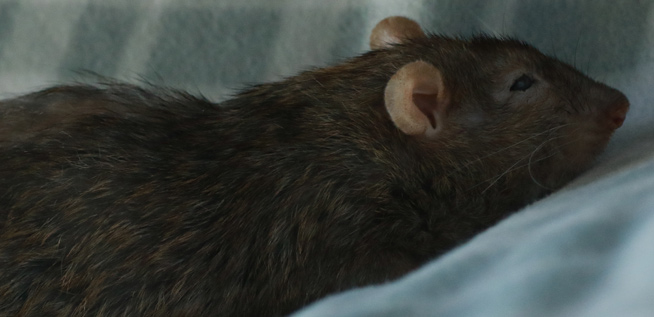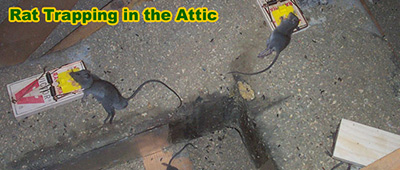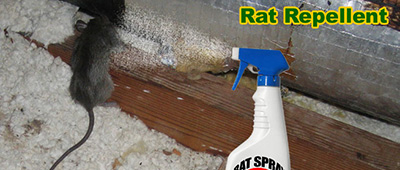Need professional rat help? What does it cost? Go to the home page
In theory, you would think that cats WOULD keep rats at bay, but it's often definitely not the case. We have been called out to a great number of homes that also contain both cats and dogs, and yet these homes are still infested with rats. If cats and dogs were as great at rat-catching that everyone thought, there would be no rats in properties that were also home to these creatures.
Sticking with the subject of cats, and they are often rather scared of rats. Rats have grown bigger and larger than we've ever seen them before, and in some cases, the rat can be almost as big as a small cat. Generally they grow to about 30 to 40 cm in length, tail not included, but there are constant reports on the news that they have grown much bigger than that - fatter as well as longer.
Cats are not particularly used to dealing with larger rodents like that, mice being generally their biggest play-thing, and will often run away from the larger rat, particularly if they are even larger than usual.
Of course, owning a pet could actually be the reason that you have rats in the first place. What do you do every morning or every night for your pet? You put down food and water for it, usually in a bowl, and almost always on the floor. If your cat or dog can get to these places, a rat most certainly can, and in some cases, the rat may even have swiped the food from right under your pet's nose. Having food left lying around is the biggest thing that attracts rodents to residential and commercial properties. Owning a cat is actually more likely to attract rats, rather than deter them.
Of course, there are many other things that you will need to think about when it comes to owning a cat and trying to get rid of rats at the first time. You will need to make sure that your domestic cat doesn't get too close to the rat trap, for example, otherwise you might find yourself rushing to the vets and with a very big bill on your hands. At the same time, you can't put poison down because you will run the risk of your cat getting to it. Not that we would ever recommend you using poison to get rid of the rats, of course. This often causes more problems than provides solutions, just in case you didn't already know.
And, on top of that, there are diseases to worry about, many of which a rat can both carry and transmit to your poor pampered pet. Ticks and fleas are one of the biggest things to worry about, but rabies isn't a common occurrence. There are a whole host of other diseases which a rat can pass onto your pet, however, and these are situations you most definitely do not want on your hands.
Find out more: Rat diseases that affect humans
In short, cats do not keep rats away. Their food might even attract them. Cats are often scared by large rodents, such as mice, and there are diseases that rats can carry that can be passed onto your pet. On top of that, you will have a nightmare situation getting rats out when you have a cat, and it's even worse when you have multiple - cats. You will need to make sure they can't get access to any traps or poisons, and are also safe from rat attack, and the diseases they can transmit in the process.
Rats + cats = a very bad idea.
Go back to the Rats in the Attic home page.
Learn more with some other educational articles I wrote:
What if a rat got inside my house?
Do rats make good pets?
Do dogs keep rats away?
Are rats dangerous to cats, dogs, or other pets?

There are many examples throughout history that suggest cats are the ultimate rat hunters, such as the phrase “cat and mouse game” which suggests the constant pursuit of something that is almost caught but repeatedly manages to escape.
For those too young to remember the classic cartoon Tom and Jerry, the premise for every episode was that Tom - a cat - would try and catch Jerry - a mouse. You may instead prefer the exploits of Itchy and Scratchy in The Simpsons. But whilst mice and rats are extremely different species, it nonetheless conjures up an image of cats being very good at controlling rat problems. And, despite their reputation, cats are actually not that effective at catching rats.
To start with, cats do not exclusively hunt rats. Assuming they are not a house-bound cat, you may find it catches other creatures like lizards, frogs, and birds. Additionally, if you keep rats or mice as pets, the scent alone of your cat will make them extremely anxious. This can be useful for keeping rats away, but in reality, cats are not worth considering if you know you already have rats.
A five-month-long study was conducted by a team from Fordham University in which they observed a colony of rats in a waste management facility in Brooklyn. Over the entirety of the study, the researchers only recorded three instances of local cats actually ambushing the 150-strong colony. Only two were killed.
According to the results, the cats were hesitant to actually approach the rats and would stop if the rat came to a halt. The researchers posited that it might have been because of the size of the rats relative to the cats, suggesting that whilst almost all cats will happily hunt mice, different breeds of cats in different stages of development may be disinclined to target the heftier rat.
Other studies suggest that whilst cats are inherently born to chase other creatures, it varies significantly depending on the cat’s upbringing. Cats can be described as “mousers”, which suggests they have honed their natural affinity for hunting, but not all cats grow up in an environment that encourages hunting.
Another important thing to consider is that rats are some of nature’s most adaptive survivors, having been around for millions of years. A hungry or desperate rat will likely do anything it can in order to survive, which is not limited to attacking other creatures, including cats.
And even if a cat will go after rats, it is likely that cats do it because they enjoy the hunt itself, and do not have a vendetta against the rat. Hunting is fun for cats; it keeps them alert and exercised. And rather than kill rats, cats are more likely to keep it alive and bring it to you as its owner as a trophy because, strangely, it is trying to teach you how to hunt.
Counterintuitively, dogs might actually be a better bet for catching rats than cats.








